(View From The Couch is a weekly column that reviews what's new on Blu-ray and DVD.)
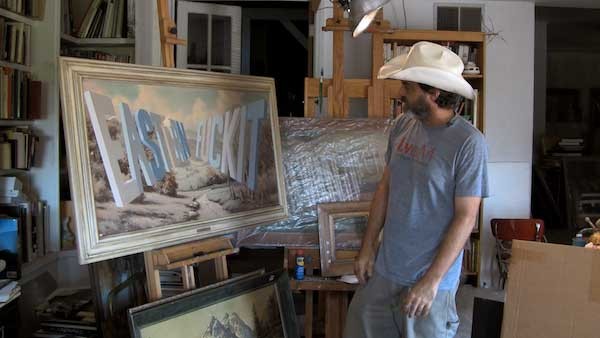
-
Wayne White in Beauty Is Embarrassing (Photo: Docurama)
BEAUTY IS EMBARRASSING (2012). While there have been many documentaries about artists, this look at the life and work of Wayne White is probably closest in kindred spirit to Terry Zwigoff's 1994 Crumb. In both movies, it's made clear that these unusual men were driven to create, and that nothing could stop the artistic juggernauts that resided within their very souls. The clear difference is that, for all his eccentricities, White is a far more grounded individual than R. Crumb, and while he does confess a fondness for a certain four-letter word — he loves to use "FUCK" in many of his pieces — he's not haunted by the demons that have long possessed Crumb and allow him to remain a lightning rod of controversy. Not surprisingly, this means that Beauty Is Embarrassing doesn't possess the gravitas of Crumb, but it's no lightweight, either. Among other subjects, it touches upon an artist's perpetual struggle to make money while remaining true to his or her ideals, examines the importance of a support system that allows someone the freedom to pursue a dream (in this case, the support system is Wayne's wife Mimi Pond, who wrote the very first episode of The Simpsons before electing to devote her life to Wayne and the kids), and, through Wayne's folks and friends back in Tennessee, intriguingly shows how having a child (or neighbor) who is different or odd doesn't mean that meat-and-potato types can't still traffic in encouragement and pride (an encouraging message in these times of bullying community outsiders). If for no other reason, the film should at least be seen for its visuals — or, rather, for White's visuals. He was a three-time Emmy Award winner for his set work on Pee-wee's Playhouse, and we're treated to vintage footage of the show. We also see many of his paintings, emblazoned with such slogans as "STARFUCKER" and "EASTERN FUCK IT" (what'd I tell ya about his proclivity for that word?). And we also witness him traipse around in a gargantuan Lyndon B. Johnson head, a sight as disconcerting as it is funny.
DVD extras include audio commentary by White and director Neil Berkeley; deleted scenes; a slide show featuring White's artwork; and White performing "Blue Ridge Mountain Blues."
Movie: ***
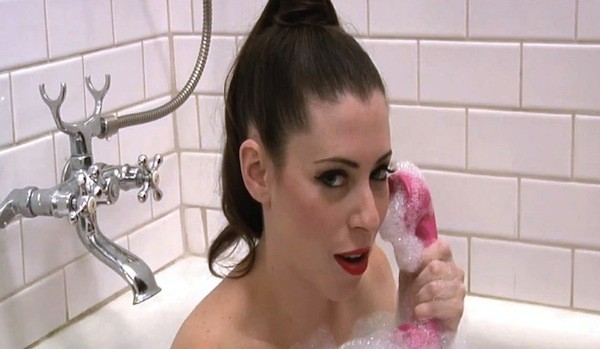
-
Lauren Ann Miller in For a Good Time, Call ... (Photo: Universal)
FOR A GOOD TIME, CALL... (2012). A better buildup and a few more potent gags might have elevated this from bridesmaid status in the comedy genre to Bridesmaids status as an across-the-board hit. Lauren Ann Miller, who co-wrote the script with newbie Katie Anne Naylon, and Ari Graynor star as Lauren and Katie, two dissimilar roommates who are struggling financially. After Lauren loses a coveted job, she discovers that Katie makes money on the side as a phone-sex operator, handling calls from within her own bedroom. Seeing the potential of such a racket — and desperate enough to try anything — Lauren puts her business savvy to work, handling the behind-the-scenes activity while Katie continues to give good voice. Eventually, the straight-laced Lauren grows tired of being "boring" and decides to join Katie in talking dirty to horny clients. For a Good Time, Call... adheres to formula a bit too often: Naturally, the ladies' best friend is gay (Justin Long is appealing in the role), and viewers can see the wedge that will drive the friends apart even before the butter on that microwave popcorn begins coagulating. And there are some blown opportunities as well: Sugar Lyn Beard is delightful as a squeaky-voiced girl who joins the phone-sex biz, but rather than keeping her character around, the filmmakers clumsily employ her for a finger-wagging gag that fizzles out. Yet what makes the film succeed is the relationship between Lauren and Katie. We've had our share of movies focusing on the good-natured nobility of — God, how I hate this word — "bromances," but Bridesmaids aside, most comedies centering on female friendships tend to paint the ladies in a grotesque light (Something Borrowed, Bride Wars, etc.). This picture explores the give-and-take dynamics between the pair in a sympathetic and believable manner, with both actresses excelling in their characterizations. It provides for a fairly good time as a weekend diversion and, best of all, the rental cost won't break down to $2.99 a minute.
The Blu-ray contains both the R-rated theatrical version and an unrated cut that's three minutes longer. Extras include audio commentary by Miller, Graynor, Naylon and director Jamie Travis; a making-of featurette; and deleted scenes.
Movie: **1/2

-
Joan Crawford and Wallace Beery in Grand Hotel (Photo: Warner Bros.)
GRAND HOTEL (1932) / MRS. MINIVER (1942) / DRIVING MISS DAISY (1989). Landing smack-dab in the middle of Oscar season are new editions of three past winners, all making their Blu-ray debuts.
The first truly all-star film ever made, Grand Hotel managed to pack five box office giants into one movie, a decision that resulted in a resounding hit for MGM. Set in a luxurious Berlin hotel, the movie looks at the intersecting lives of five of its guests. Burned-out ballerina Grusinskaya (Greta Garbo) wails, "I want to be alone"; the penniless Baron (John Barrymore) has resorted to stealing to get out of debt; the nasty businessman Preysing (Wallace Beery) is trying to pull off a difficult transaction; the stenographer Flaemmchen (Joan Crawford) hopes to get ahead in life; and the dying laborer Kringelein (Lionel Barrymore) wants to go out with a bang. Creaky in spots, the film still triumphs due to its neatly interwoven plotlines, strong characterizations by the leads, and the expected MGM gloss. Crawford's never been my cup of tea — I'm Team Bette (Davis, of course) all the way — but here she's positively radiant, and she steals the movie from her formidable co-stars. Grand Hotel was nominated for a grand total of one Academy Award, which it ended up winning: Best Picture.
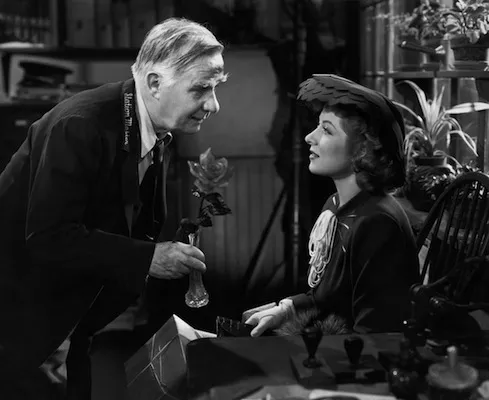
-
Henry Travers and Greer Garson in Mrs. Miniver (Photo: Warner Bros.)
No less than Winston Churchill called Mrs. Miniver "propaganda worth a hundred battleships," and it's easy to see why. Fashioned by director William Wyler as a way to get Americans thinking about the British plight during World War II, the movie focuses on an English family whose existence in a peaceful village is disrupted by the carnage of the conflict. Greer Garson portrays the title character, doing her best to maintain a steely resolve even amidst all the chaos; Walter Pidgeon co-stars as her husband Clem, Richard Ney plays their oldest son Vin, and radiant Teresa Wright appears as Vin's sensible sweetheart Carol. This was followed eight years later by the largely forgotten The Miniver Story, again starring Garson and Pidgeon. Nominated for 12 Academy Awards, this earned six, including Best Picture, Actress (Garson), Supporting Actress (Wright) and Director (Wyler).
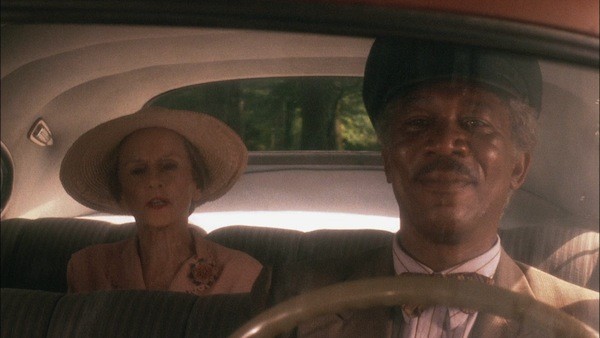
-
Jessica Tandy and Morgan Freeman in Driving Miss Daisy (Photo: Warner Bros.)
Driving Miss Daisy became the first film since 1932's Grand Hotel to win the Best Picture Academy Award without its director being nominated, which provides a sliver of hope for those of us pulling for an Argo upset in this year's contest. But more than the slighting of helmer Bruce Beresford, this adaptation of Alfred Uhry's Pulitzer Prize-winning play (scripted by Uhry himself) is infamous in Oscar history for exposing the Academy's white roots in a year that saw two superior films about race relations not even receive Best Picture nominations. Spike Lee's inflammatory Do the Right Thing was the real best picture of 1989, while Glory, about heroic black soldiers during the Civil War, was also a sterling achievement; naturally, the organization elected to ignore those works and honor the one in which a black man is subservient to a white woman. Set over a span of 25 years, the movie details the relationship between the crotchety Daisy Werthan (Jessica Tandy) and her jovial chauffeur Hoke (Morgan Freeman) while also noting their reactions to the social changes happening around them. A sleeper hit at the box office, Driving Miss Daisy is a pleasant piece which derives much of its juice from the turns by Tandy and especially Freeman, but it's hardly Best Picture material. Dan Aykroyd co-stars as Miss Daisy's patient son Boolie; he's affable in the role, though scarcely believable. Nominated for nine Academy Awards (including nods for Freeman and Aykroyd), the film won four: Along with that Best Picture designation, it also snagged Best Actress, Adapted Screenplay and Makeup.
Blu-ray extras on Grand Hotel include audio commentary by film historians Jeffrey Vance and Mark A. Vieira; a making-of featurette; fascinating footage from the film's Hollywood premiere; and trailers for both Grand Hotel and the 1945 remake Week-End at the Waldorf, starring Ginger Rogers and Lana Turner. Extras on Mrs. Miniver include newsreel footage of Garson accepting her Best Actress Oscar; the theatrical trailer; and two Oscar-nominated shorts from 1942: the documentary Mr. Blabbermouth! and the cartoon Blitz Wolf. Extras in the Driving Miss Daisy DigiBook include audio commentary by Beresford, Uhry and producer Lili Zanuck; a new making-of retrospective; and a featurette on Tandy.
Grand Hotel: ***1/2
Mrs. Miniver: ***1/2
Driving Miss Daisy: ***

-
Searching for Sugar Man (Photo: Sony Pictures Classics)
SEARCHING FOR SUGAR MAN (2012). One of the best films of 2012 (go here for a complete look at the Best & Worst Movies of 2012), this Oscar nominee for Best Documentary Feature centers on the remarkable story of Sixto Rodriguez, a Detroit musician who released two albums in the early 1970s that went absolutely nowhere. Soon after, Rodriguez disappeared from sight, and the rumors grew that he had set himself on fire and blew his own brains out on stage. But a funny thing happened on the way to obscurity: The singer's music made its way to South Africa, where it soon became the soundtrack for a young generation seeking creative ways to voice its disapproval of the country's Apartheid regime. Director Malik Bendjelloul takes this material and turns it into a mystery worthy of Ellery Queen, following South African record store owner (and Rodriguez fan) Steve Segerman as he tries to find out what really happened to Rodriguez. Along the way, Bendjelloul also tracks the progression of protest music in South Africa and interviews key figures from Rodriguez's life. To reveal anything that transpires during the film's final half-hour would be criminal. Searching for Sugar Man is a must-own, yet equally worthy of purchase is the motion picture soundtrack, which culls 16 songs from Rodriguez's two albums, 1970's Cold Fact and 1971's Coming from Reality.
Blu-ray extras include audio commentary by Bendjelloul and Rodriguez; a making-of featurette; and a discussion with Bendjelloul and Rodriguez.
Movie: ***1/2

-
Richard Burton, Roger Moore and Richard Harris in The Wild Geese (Photo: Severin)
THE WILD GEESE (1978) / ASHANTI (1979). As a lifelong movie buff, one of the highlights of spending my formative years overseas was the opportunity to see films that were successful internationally but, for various reasons, barely released stateside. Severin Films has graciously served up two such titles, action yarns that I caught numerous times during my teen years but only sparingly as an adult.
The Wild Geese was a global smash in 1978, but by the time its American distributor, Allied Artists, was ready to debut it here, the studio went bankrupt, leading to a dismally small launch for such an A-list project. And despite the film's success elsewhere, it still had to deal with warranted controversy, as it was frequently derided for being filmed in South Africa (and thus providing ample profits for that country's Apartheid government). Repugnant politics aside, the movie itself is a winner, relating the story of a group of 50 mercenaries who are hired to sneak into an African country and rescue a honorable (and deposed) president (Winston Ntshona) before he's executed. The leader of the mission is Allen Faulkner (Richard Burton), flanked by his trusted friends Rafer Janders (Richard Harris) and Shawn Flynn (Roger Moore); their assignment appears to go smoothly until a betrayal forces the team to fight its way out of hostile territory. The widely reported stories of what happened off-screen are almost as memorable as what's taking place on it — among other tidbits, noted boozehounds Burton and Harris both remained sober during the film's shoot; Harris replaced Burt Lancaster after the latter was booted for demanding too many script changes; Moore squeezed this in between the productions of two James Bond flicks; the film's London premiere, with the Duchess of Kent in attendance, was marked by anti-apartheid protesters; and Gene Siskel named it the worst film of 1978 (amusingly, another Richard Burton vehicle from 1978, The Medusa Touch, was Roger Ebert's pick as the year's worst). But for fans of such (admittedly superior) men-on-a-mission flicks like The Guns of Navarone and Where Eagles Dare, this is a gripping piece of entertainment, well-scripted by 12 Angry Men scribe Reginald Rose, manned with a supporting roster of seasoned British actors, and showcasing Harris in an unexpectedly poignant role. Incidentally, the critics who are comparing this to The Expendables (including one on the Blu-ray box itself) are revealing themselves to be all shades of clueless.
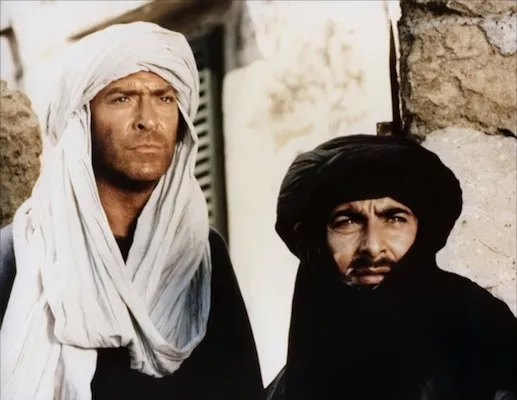
-
Michael Caine and Kabir Bedi in Ashanti (Photo: Severin)
Unlike The Wild Geese, Ashanti isn't nearly as stellar as it seemed to me back in the day. Still, I clearly like it better than star Michael Caine, who once called this the worst movie he's ever made. Considering Caine has also starred in sizable turkeys like Beyond the Poseidon Adventure, Jaws: The Revenge, Steven Seagal's On Deadly Ground and that misbegotten Sleuth remake, that statement should be taken with a few dozen grains of salt. Focusing on the subject of modern-day slavery, the movie isn't as exploitative as it could have been, but neither is it as hard-hitting as the topic requires. Caine and African-American supermodel Beverly Johnson play David and Anansa Linderby, U.N. doctors working in Africa. Anansa is snatched by slave traders led by the notorious Suleiman (Peter Ustinov), and David is forced to team up with a revenge-driven Bedouin (Kabir Bedi) to locate and rescue his missing wife. An amusing Ustinov overacts with zeal, big-name stars like William Holden, Rex Harrison and Omar Sharif pop up in colorless parts, and Indian actor Bedi (a childhood hero thanks to his starring role in the 1976 Italian miniseries Sandokan) makes a rare but welcome appearance in an English-language feature film (four years later, he would play the villainous henchman Gobinda in the 007 entry Octopussy). Aldo Tonti's panoramic lensing (the movie was shot in gorgeous Kenya although the story is set further north) and Michael Melvoin's fine score help turn this into a glossy guilty pleasure.
Blu-ray extras on The Wild Geese include audio commentary by Moore, producer Euan Lloyd and editor and second unit director John Glen (who would later helm five consecutive Bond flicks starting with 1981's For Your Eyes Only); a vintage making-of featurette; The Last of the Gentleman Producers, a piece on Lloyd; new interviews with director Andrew V. McLaglen and military advisor Mike Hoare; and footage from the film's royal premiere benefitting the SOS (Stars Organisation for Spastics) charity. The only extras on Ashanti are an interview with Johnson and the theatrical trailer.
The Wild Geese: ***1/2
Ashanti: **1/2
